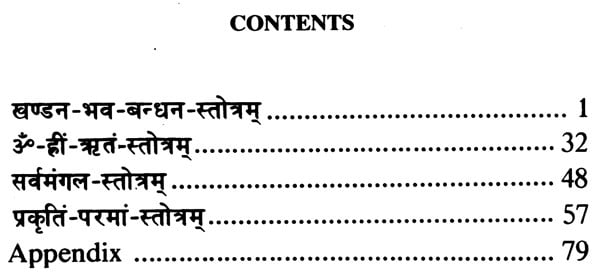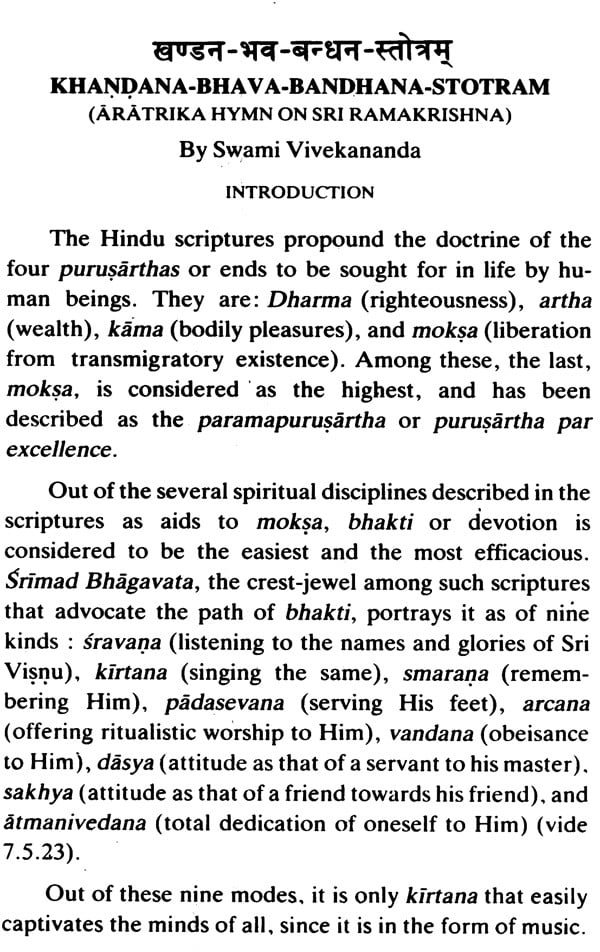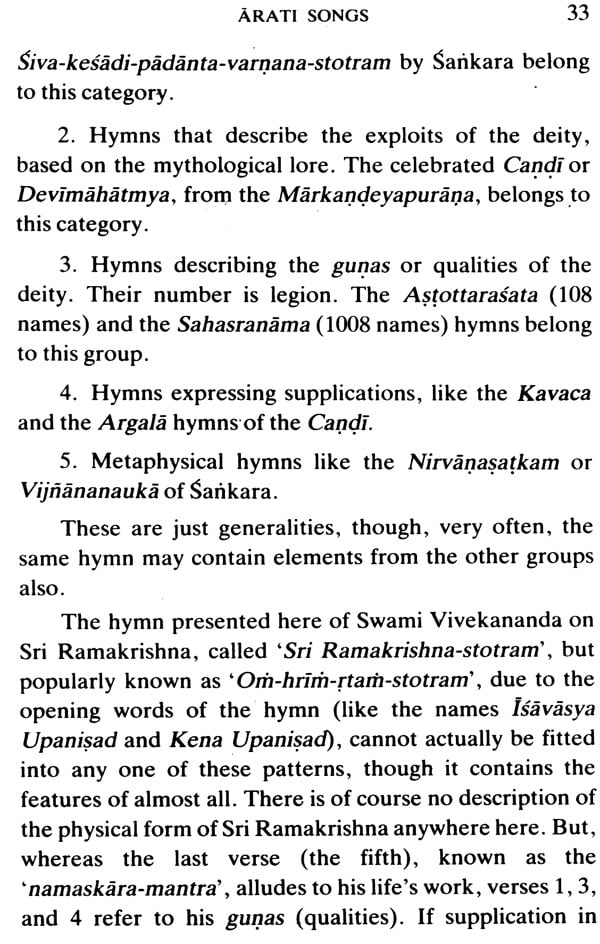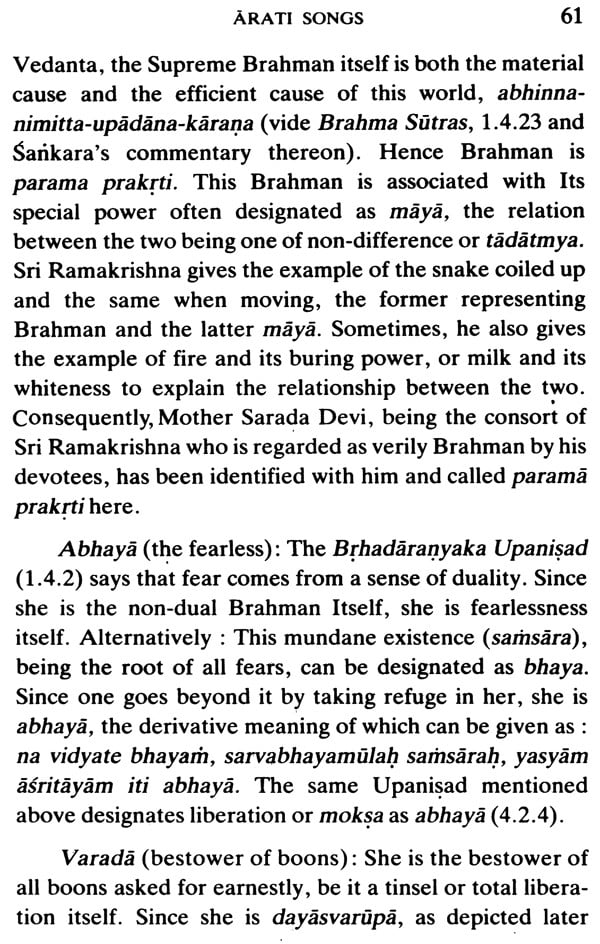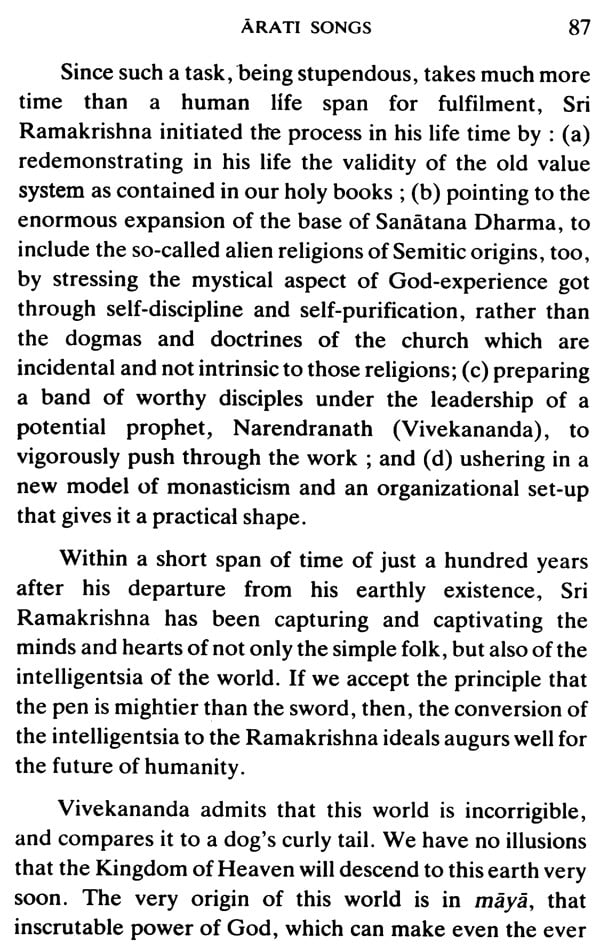
Arati Songs of The Ramakrishna Order ((Sanskrit Text, Transliteration, English Translation and Detailed Commentary))
Book Specification
| Item Code: | IDI817 |
| Author: | Swami Harshananda |
| Publisher: | ADVAITA ASHRAM KOLKATA |
| Language: | (Sanskrit Text, Transliteration, English Translation and Detailed Commentary) |
| Edition: | 2016 |
| ISBN: | 8175051329 |
| Pages: | 94 |
| Cover: | Paperback |
| Other Details | 6.9" X 4.6 |
| Weight | 70 gm |
Book Description
Swami Harshananda, a senior monk of the Ramakrishna Sangha, has translated and annotated the Arati Songs of the Ramakrishna Order. These Arati Songs are sung every evening in almost all the centres of the Ramakrishna Order in India and abroad. They are also sung in the homes of many devotees of the Sangha. In order to acquaint these devotees with the deeper meaning of these beautiful hymns we are bringing out this new translation into English with annotations so that those who sing them with devotion and understanding may derive the maximum spiritual benefit. We are thankful to Swami Harshananda for his faithful translation and scholarly annotations.
We hope the widening circle of devotees of the Ramakrishna Sangha will welcome this new publication and take full advantage of it. We will be amply rewarded if it helps them grow in spirit.
Preface
Every religion has certain rituals built into its practical disciplines. Prayer to God at dawn and dusk is an important of this discipline. In the monastic centres of the Ramakrishna Order, though there is no set pattern for the prayers at dawn, the vespers or the Arati Songs are well defined. They are: Khandana-bhava-bandhana, om hrim rtam tvamacalo, and Sarvamangala-mangalye. of these, the first two are the compositions of Swami Vivekananda himself on Bhagavan Sri Ramakrishna. The third is a part of the hymn known as the Narayaniya-stuti, which again forms an integral part of the well-known Sakta scripture, the Devimahatmyam, also known as the Durgasaptasati or the Candi. Since these three verses were chanted by Sri Ramakrishna at the end of the sodasi-puja which he offered to the Divine Mother in the person of Sri Sarada Devi, the Holy Mother, to mark the completion of his long series of Sadhanas, they have been accepted as a prayer hymn addressed to her. The last one is composed by Swami Abhedananda, a direct disciple of Sri Ramakrishna, on Sri Sarada Devi. Except the first hymn which is in Bengali, the rest are in Sanskrit.
Apart fro being composition of exquisite poetical elegance, these hymns also contain nuggets of deep philosophical truths, an understanding and unravelling of which will enable us to appreciate these supremely sublime personalities who are adored through them. This work is a humble attempt in this direction.
A mechanical singing of these hymns can exercise our vocal cords. If faith and devotion are added, the singing can purify our hearts. It there is also a contemplation on the meaning at the same time, it can purify our intellects too. Then the effect will be infallible.
The devotees of Sri Ramakrishna have been singing these hymns for years and have been bathed in their effusive melodies. If this work of translation and annotations can add a new dimension of awareness of not only the beauty and the sublimity of these compositions but also of the deities to whom they are addressed, the writer will feel blessed.
I take this opportunity to offer my humble thanks to the President of the Advaita Ashrama for having kindly agreed to publish it. I am also grateful to Revered Swami Ananyanandaji for having gone through the whole manuscript and revised it wherever necessary.
Back Of The Book
The Arati Songs comprises four hymns of praise of and supplication to Sri Ramakrishna and Sri Sarada Devi. The hymns are sung in the Ashramas of the Ramakrishna Order and also in thousands of homes of their devotees during vespers.
Swami Harshananda's translations of the hymns and commentaries on them reveal their hidden meaning. The Appendix of Avataravaristha adds to the value of the book.
Book's Contents and Sample Pages